Coordination
Background
Effective coordination can prevent gaps and overlaps in humanitarian responses, ensure the impact of CVA is optimised for the benefit of crisis affected populations, whilst also making the most of limited humanitarian funding. But the CALP Network’s State of the World’s Cash report found that cash coordination is seen as weak and ad hoc, and that this is having serious operational impact.
Ninety-five donors, international and national NGOs, private sector actors and one UN agency have called for clarity on two key issues surrounding cash coordination:
- Who should be accountable for ensuring effective cash coordination, and
- What the scope of Cash Working Groups should be, including in relation to multipurpose cash.
We urgently need to build on what works and provide clarity at the global level on the questions above, whilst adapting to different contexts. Clear decisions based on the impact on affected populations rather than agency politics are long overdue.
Current priorities
We aim to contribute to progress on this issue on three levels: supporting Cash Working Groups at the regional level; contributing to practical solutions for cash coordination at the global level; and convening evidence-based discussion on the key issues, highlighting critical decision points and opportunities for progress.
Featured content

Cash Coordination – LIVE timeline
Page
The latest updates on cash coordination as they unfold.

95 Organisations Sign Letter Calling for Strengthened Cash Coordination
News
Today a letter signed by 95 organisations was handed into the Emergency Relief Coordinator (ERC) urging the Inter-Agency Standing Committee (IASC) to take a decision on the leadership and scope of cash coordination in the coming year.

Is cash transforming the humanitarian system or is the system limiting how cash is used?
Blog Post
At the State of World’s Cash 2020 launch event, Sorcha O’Callaghan, Director of Humanitarian Policy Group at ODI warned that, “Cash offers a huge transformative potential, but as far as the system is privileging the interest of the agencies over people in crisis, we won’t be able to see it”. If you missed the State of the World's Cash 2020 launch we're sharing highlights. Quote 4...
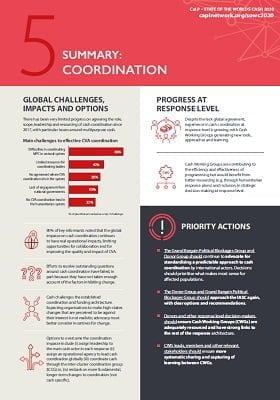
State of the World’s Cash 2020 Chapter 5 summary: Coordination
Report
There has been very limited progress on cash coordination since 2017. Cash continues to challenge the established coordination and funding architecture, and efforts to resolve outstanding questions around cash coordination have failed. Despite the lack of global agreement, Cash Working Groups are pushing forward and contributing to improved programming, and generating new approaches. This...

Cash Coordination Tip Sheet
Guidelines and Tools
This tip sheet sets out established best practice, key guidance and resources for all aspects of cash coordination, intended as a clear, accessible and action-oriented guide for those engaged in coordination of cash and voucher assistance (CVA) at the field level.

Introducing the Cash Coordination Tip Sheet
Webinar
The CALP Network has developed a tipsheet setting out established best practice and key guidance and resources for all aspects of cash coordination, intended as a clear, accessible and action-oriented guide for those engaged in coordination of cash and voucher assistance at the field level.

Cash Coordination: A proposal from members in MENA
Blog Post
Earlier this year the CALP Network undertook regional consultations to explore options for cash coordination. This blog lays out recommendations from participants from the Middle East and North Africa who sketched out what cash coordination, and coordination more broadly, could look like in future to support a more effective, efficient and accountable response.
Thematic lead
Latest
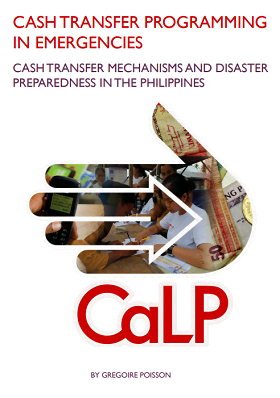
Cash transfer mechanisms and disaster preparedness in the Philippines
Report
The use of cash to deliver assistance in case of humanitarian emergency remains a relatively new approach in the Philippines, and aid agencies are at the early stages of developing guidelines, policies and organizational capacity to implement cash projects. Project managers lack support and guidance with...
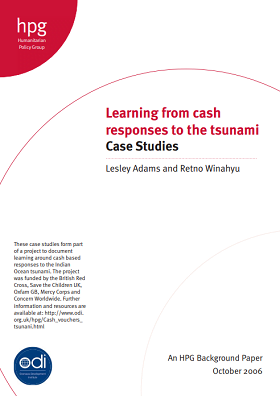
Learning from Cash Responses to the Tsunami: Case Studies
Case Study
These case studies form part of a project to document learning around cash based responses to the Indian Ocean tsunami. The project was funded by the British Red Cross, Save the Children UK, Oxfam GB, Mercy Corps and Concern Worldwide.
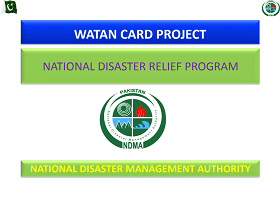
Watan Card Project – Pakistan National Disaster Relief Program
Presentation
Presentation to the CALP Network 4th Global Learning Event (Bangkok, February 2011) from the National Disaster Management Authority of the Government of Pakistan. The presentation reviews the WATAN card cash transfer programme implemented by the Government to transfer money to flood affected people. The...
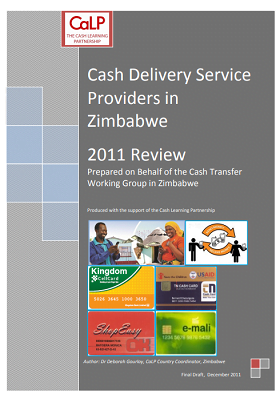
Cash Delivery Service Providers in Zimbabwe
Report
Over the past few years Zimbabwe has witnessed a significant increase in the use of cash transfers within policies and programs providing humanitarian aid. This has resulted is an increasing desire on the part of humanitarian agencies to partner with private sector financial service providers in the...

Niger: Unconditional cash transfers in Tanout
Case Study
This case study documents the one time unconditional cash transfer programme carried out by the British Red Cross, for households vulnerable to food insecurity, as part of its overall emergency and recovery project following the 2004/5 Food crisis in Niger. It details the context, situational analysis,...
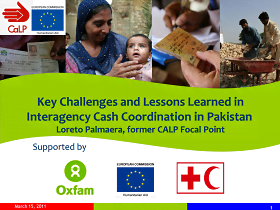
Key Challenges and Lessons Learned in Interagency Cash Coordination in Pakistan
Presentation
A presentation from the CALP Network’s former focal point Loreto Palmaera on ‘Key Challenges and Lessons Learned in Interagency Cash Coordination in Pakistan’
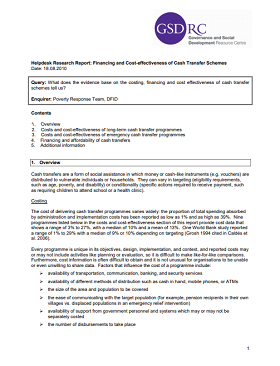
Helpdesk Research Report: Financing and Cost-effectiveness of Cash Transfer Schemes
Report
Query: What does the evidence base on the costing, financing and cost effectiveness of cash transfer schemes tell us? Cash transfers are a form of social assistance in which money or cash-like instruments (e.g. vouchers) are distributed to vulnerable individuals or households. They can vary in targeting...
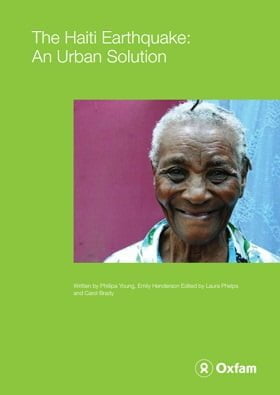
The Haiti Earthquake: An Urban Solution
Case Study
This case study looks at the Oxfam economic and livelihood recovery programme following the devastating earthquake in early 2010. A range of cash transfer programming was implemented after a detailed assessment was carried out. The report goes through the assessment stages, details the programme...
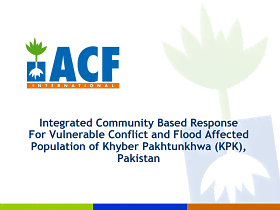
Integrated Community Based Response for Vulnerable Conflict and Flood Affected Population of Khyber Pakhtunkhwa (KPK), Pakistan
Presentation
A presentation discussing objectives, modalities, target beneficiaries and best practices of integrated community-based response for vulnerable conflict and flood-affected population of Khyber Pakhtunkhwa (KPK), Pakistan.

The Voucher programme in the Gaza Strip – Mid-term review
Report
The WFP voucher project is part of the emergency operation (EMOP 10817.0) to assist the recovery of the population affected by the conflict in Gaza Strip. WFP emergency operation has the following objectives: Meet urgent needs and improve the food consumption for conflict-affected people targeted...

Nairobi Urban Social Protection Programme
Case Study
This case study of an Oxfam urban cash transfer programme in Kenya looks at how cash can be used as part of a national social protection programme to improve access to food of the most vulnerable households, at the same time as developing longer term food and income security initiatives. The report looks...
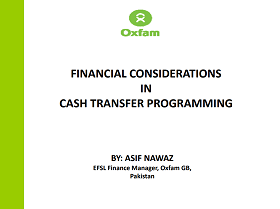
Financial Considerations in Cash Transfer Programming
Presentation
OBJECTIVES OF THE PRESENTATION • Finance considerations and challenges in CTP • Delivery Mechanisms used in the Flood Response. • Oxfam’s Experience with Order Cheques – Challenges and Innovation. • Delivery Mechanism’s – the selection dilemma.

Evaluation of OGB and HR Cash Consortium in Southern Somalia
Report
In response to the humanitarian emergency of 2006 in southern Somalia, a consortium of five agencies – Oxfam GB, Horn Relief, AFREC, WASDA and Development Concern – implemented the Emergency Drought Response Action (EDRA) programme. This was a cash-based intervention using an innovative approach with...

Communicating Cash: A quick guide to field communications in cash transfer programming
Guidelines and Tools
Communicating with beneficiaries and their communities can be critical to the success of a cash transfer or voucher programme. Communications play a key role in guaranteeing transparency and accountability. This field guide covers the basic elements of a communications strategy to support a cash or...
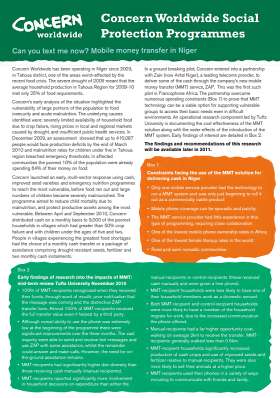
Can you text me now? Mobile money transfer in Niger
Case Study
This case study looks at Concern Worldwide’s ground breaking project using a new mobile money transfer system in Niger, following the severe drought of 2009, to demonstrate the effectiveness of this technology in supporting vulnerable groups to access their basic needs. This very brief document looks at...

WFP’s Current C&V Portfolio
Presentation
A presentation aimed at solidifying a common understanding of where WFP is and where it is going. Topics include: Shift from food aid to food assistance From pilots to scale Portfolio trends since 2009 Global C&V by programme category.

Evaluation of Cash Relief Programme implemented by Horn Relief
Report
This evaluation of the Emergency Cash Relief Programme (ECRP) was conducted between the 10th -22nd of June 2004. The evaluation looked at the various issues of programme operation and management, including financial management, and used an overall performance-scoring matrix for this purpose. The overall...
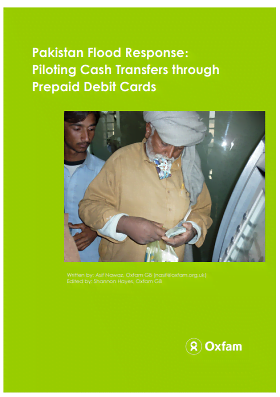
Pakistan Flood Response: Piloting Cash Transfers through Prepaid Debit Cards
Case Study
This case study looks at the pilot study carried out by Oxfam to test the innovative payment method of pre-paid debit cards in Pakistan following the 2010 flood. The objective was to understand the viability and effectiveness of the United Bank Limited’s WIZ pre-paid debit card, as a valid payment...
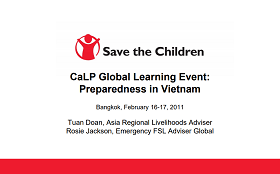
Cash Preparedness in Vietnam
Presentation
A presentation from the the CALP Network Global Learning Event, addressing Save the Children’s Preparedness in Vietnam Bangkok, February 16-17, 2011. Topics include: Emergency preparedness Cash intervention design Lessons learned
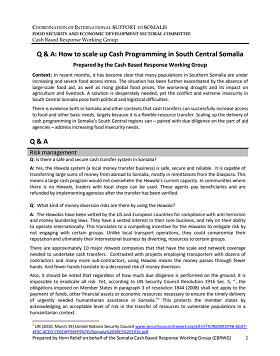
Q&A – Cash Transfers in South Central Somalia.
Report
Context: In recent months, it has become clear that many populations in Southern Somalia are under increasing and severe food access stress. The situation has been further exacerbated by the absence of large-scale food aid, as well as rising global food prices, the worsening drought and its impact on...
